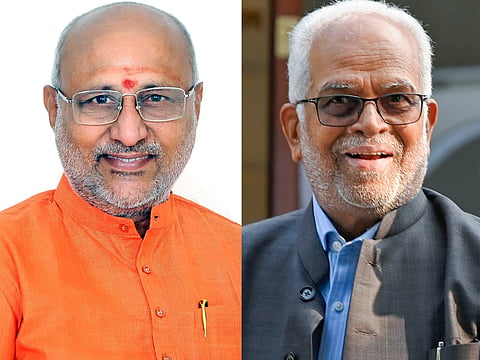Inside India’s vice-president contest: RSS pressure, Tamil pride, and Andhra dilemma
The numbers favour BJP, but the politics point to deeper insecurities

Jagdeep Dhankhar, India’s Vice-President and number two on the warrant of official precedence, suddenly resigned midway through his term. His mystery exit necessitated an election that neither the Modi government nor the opposition wanted.
The Modi government’s pick — the current Maharashtra governor C.P. Radhakrishnan, a Rashtriya Swayamsevak Sangh (RSS) and BJP veteran — is perhaps a belated realisation of two things. First, it needs one of its own to manage the Rajya Sabha without an absolute BJP majority. Dhankhar, a turncoat from two parties and another ideology, may not have been an ideal choice, though when he was picked — after giving Mamata Banerjee a hard time as governor of West Bengal — it was obediently hailed as a “master stroke” by the tame media.
Second, the RSS, which is sensing weakness at the heart of the Narendra Modi-led BJP, has to be kept in good humour. Modi’s description of the RSS as the “world’s largest NGO” from the Red Fort on Independence Day should be seen in this light.
Wooing the RSS
BJP’s top leaders are now making assiduous attempts to keep the RSS happy as the organisation, which turns 100, asserts itself. The RSS has benefited immensely in profile, clout, and prosperity since 2014, but was largely kept out of political decision-making by the Modi–Amit Shah duo. Recall BJP president J.P. Nadda declaring that the BJP didn’t need the RSS anymore. Now, the tables have turned — the BJP needs it, and the RSS is playing tough.
By picking Radhakrishnan, a choice vetted by the RSS, the BJP is attempting course correction. It also reckons that choosing a Tamilian could put the Dravidian parties in a political pickle. The BJP and the wider Sangh Parivar view Tamil Nadu as the “final frontier” for Hindutva politics, given that even after three Modi terms, the Sangh has made no real political headway in the state. Assembly elections are due there in 2026.
This was the thought process explained by five BJP leaders I spoke to for this SWAT analysis. Judging by the effusive “beloved’s” scattered in Radhakrishnan’s thanksgiving tweet, the Modi government does not expect a Dhankhar-style ambush.
Former judge opposition candidate
The opposition has chosen former Supreme Court judge B. Sudarshan Reddy as its candidate. Known for some liberal judgements, Reddy hails from Andhra Pradesh, posing a dilemma for the N. Chandrababu Naidu-led Telugu Desam Party (TDP), a BJP ally whose support the Modi government relies on.
Reddy, from Rangareddy district, was appointed Andhra Pradesh High Court judge in 1995 and elevated to the Supreme Court in 2007. His candidacy pits “Andhra pride” against “Tamil self-respect.” Unlike the Shiv Sena, which once supported the UPA government’s pick for President Pratibha Patil for “Marathi manoos pride,” neither formation is likely to break ranks this time.
On numbers, the BJP candidate appears to have the edge. The vice-president is elected by an electoral college comprising members of both Houses of Parliament — 782 in total, with 392 votes required to win. The NDA’s tally of 293 in the Lok Sabha and 133 in the Rajya Sabha ensures victory, unless the TDP rebels.
Predictable politics
After 11 years of Modi in power, this is tired, predictable politics from both sides. Earlier, Modi was known for imaginative surprises, but now familiarity has dulled the edge. The opposition continues to play reactive politics, which seems its only mode.
The Modi dispensation still springs unpleasant surprises, such as the new bill introduced in the dying hours of the monsoon session. It seeks to automatically remove political officeholders, including chief ministers and ministers, if they spend 30 days in jail — even without conviction. This turns the principle of “innocent until proven guilty” on its head and has been resisted by all parties.
But the days of imaginative choices — like Dr A.P.J. Abdul Kalam, the “people’s president” and NDA’s surprise candidate in 2002 — seem over. The imperative now is ensuring the government’s writ runs in the upper house.
Rethink ceremonial posts
It is no secret that this columnist believes posts like governor, vice-president, and even president should be abolished. They are colonial relics, expensive to maintain in palatial grandeur, and add little to democracy. Most are filled with retired politicians, officials, or generals who toe partisan lines. Recall the early-morning swearing-in of Devendra Fadnavis and Ajit Pawar in 2019, conducted by then Maharashtra governor B.S. Koshyari, which collapsed within 48 hours.
Or take the story of a northern governor demanding a gold “lota” (water jug) for his ablutions, or reports of Dhankhar’s excessive demands. Clearly, once addressed as “His Excellency,” power often goes to the head.
Governors have often acted as battering rams for the Centre, stalling bills in opposition-ruled states, many of which have moved the Supreme Court. Why retain this expensive irritant in the system? The maharajas were abolished — let us abolish this modern-day princely class too.
Sadly, this is unlikely in my lifetime, since no party will give up the privilege. So, we will soon have a new vice-president.
Sign up for the Daily Briefing
Get the latest news and updates straight to your inbox








